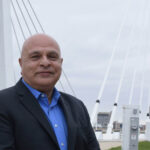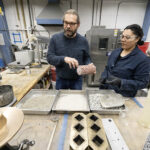An interdisciplinary team of UWM faculty is leading a paid summer school in 2023 to train students in how to integrate machine learning, computational methods, high-performance computing and cyberinfrastructure into a variety of research problems.
With backing from the National Science Foundation, the summer schools will include lectures, lab exercises and research projects from participating faculty from UWM, Marquette University and UW-Parkside.
The three-year, $500,000 grant supports the Cyberinfrastructure Comprehensive, Applied and Tangible Summer School, or CIberCATSS, led by UWM faculty members Philip Chang, physics; Mahsa Dabagh, biomedical engineering; and Susan McRoy, computer science.
While research needs and tools are diverse, there are many common computational techniques that could help students advance their work, Chang said. The grant will allow UWM and the partner institutions to help grow data science and computing in southeastern Wisconsin, he added.
“The idea behind this is that students apply what they learn to a challenge which, if met, would greatly enhance their research productivity or make some new research possible,” he said. “Students will either become better researchers in areas that rely heavily on computing or bring computing to areas of research that would greatly benefit from it.”
Students and mentors apply together with a project in mind that would benefit from some aspect of computing. They will learn both basics and advanced topics in the first three weeks and then spend the rest of the seven weeks applying their new skills to their own specific research problems.
Graduate students and undergraduate students who participate will be paid a stipend.
The expertise of participating faculty lies in areas involving large datasets, such as natural language processing, geospatial analysis, predictive modeling, cybersecurity education, computational astrophysics, cancer and disease research, robotics and bioengineering for human mobility. However, student/mentor projects do not have to fall within these areas.
Information on applying will be available later this year.





